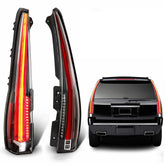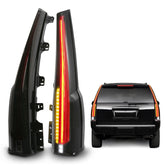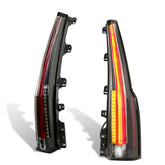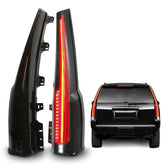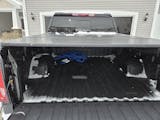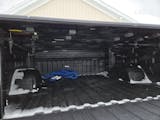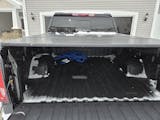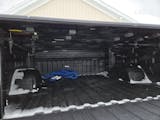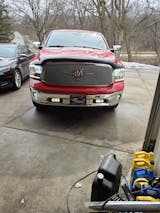How to replace tail light bulbs?
For good visibility, you need impeccable front headlights, that’s obvious. Although rear lights do not help you see the road clearly, they are still very important since they allow other motorists to easily spot you in all circumstances. Whether it's day or night, rain or good weather, rear lighting should make you visible on the roads.
Why aren't your taillights turning on?
The rear lights are the most difficult to detect as they are not directly visible. To check how they work, call a friend or park your vehicle in front of a window or mirror and carry out your tests. If one of the lights does not come on, there are several possible reasons.
The bulb is burnt out
Even if the filament looks intact, the bulb may have been damaged. It is essential to always have a spare bulb in the car. Be sure to buy quality bulbs. For the brake lights, a 21/5 W two-filament bulb is required. For indicators, three types of bulbs are possible: P21W mono-filament bayonet white, PY21W orange – which can, over time, lose its color and become dazzling – and finally PY21W Diadem or Silver. Check which bulb is most suitable for your car model.

To replace a bulb, open the rear trunk, locate the fixing screws and use a suitable screwdriver. Remove the light to reveal the bulb mounting plate and remove it to reveal them. All that remains is to unscrew the defective bulb and put in the new one.
The fuse is blown
If the bulb still does not work, the problem may be with the fuse. Replace it with an identical one.
Other possible breakdowns
If the light still does not work, the problem may come from an electrical fault in your car or from a fault linked to the switch which activates the light when braking. In this case, it will be better to go see your mechanic, unless you are a bit handy.

How to change a taillight bulb?
How to change a tail light bulb yourself on your car? Easy with this step-by-step tutorial: change the taillight bulb like a pro!
- Step 1: Locate the rear light mounting screws.
- Step 2: Our vehicle has two fixing screws along the trunk seal. Unscrew the first screw.
- Step 3: Loosen the second screw.
- Step 4: Carefully remove the fire from its housing.
- Step 5: Turn the light over to reveal the bulb mounting plate.
- Step 6: The mounting plate is where the electrical wires arrive.
- Step 7: Pinch the retaining clips to disengage the plate. Be careful the clips are fragile.
- Step 8: Remove the mounting plate that reveals the bulbs. The double filament bulb is generally used for rear side lights and brake lights. The orange bulb (transparent on older vehicles) is the indicator. You will also find a bulb for the reversing light (depending on the vehicle) and the fog lights.
- Step 9: Locate the defective bulb.
- Step 10: To remove a bulb, lightly press it, make a quarter turn and release the pressure. The bulb can be removed. Proceed in reverse for the new bulb. With the help of another person, check that the bulb is working properly (be careful, a lit bulb gets very hot; do not touch it).
- Step 11: Carefully reposition the light in its housing.
- Step 12: Screw in the two fixing screws.
- Step 12: The operation is completed.
Taillight Maintenance Tips
Proper maintenance can extend the life of your tail lights and prevent premature replacement. Clean the tail light lenses regularly to remove dust, dirt and debris. Use a mild soap or automotive glass cleaner and a soft cloth to prevent scratches.
- Regularly inspect the seals around the taillights for signs of damage or wear. Damaged joints can allow moisture to penetrate, causing a fire to become foggy or waterlogged.
- Use a special plastic polish or automotive wax with UV protection to preserve the clarity of the tail light lens and provide an extra layer of protection.
- Check regularly that all tail light bulbs are working properly. Replace any burnt out bulb immediately.
- Make sure the screws and clips holding the tail light are secure. Vibration can cause damage, so tighten any loose items.
- Inspect the wiring connected to the tail lights for signs of wear or damage. Correct any problems quickly to avoid electrical problems.
- Consider using taillight guards or parking your vehicle in a covered area to protect it from harsh weather conditions, such as hail, snow, or prolonged exposure to the sun.
- Include taillight inspection as part of your vehicle's routine maintenance and have a professional inspect them during your regular maintenance appointments.
- If your taillights break while you are driving, it is important to act immediately to ensure your safety and that of other road users.

In short, taillight maintenance is an essential component of vehicle maintenance. It is not just a question of aesthetics or performance, but above all, a question of safety. The rear lights are in fact the main communicators of your driving intentions to other users. They warn drivers behind you of your presence, your direction and, above all, your intentions to stop or change lanes. They are therefore essential to avoid collisions and ensure safe driving. Remember that their incorrect operation can have serious consequences. So, don't neglect their maintenance and make sure that they are always in perfect working order. If in doubt, do not hesitate to consult a professional.
Featured Products
- $409.99
$461.06- $409.99
- Unit price
- / per
- $409.99
- $409.99
- Unit price
- / per
- $409.99
- $409.99
- Unit price
- / per
- $399.99
$473.04- $399.99
- Unit price
- / per
